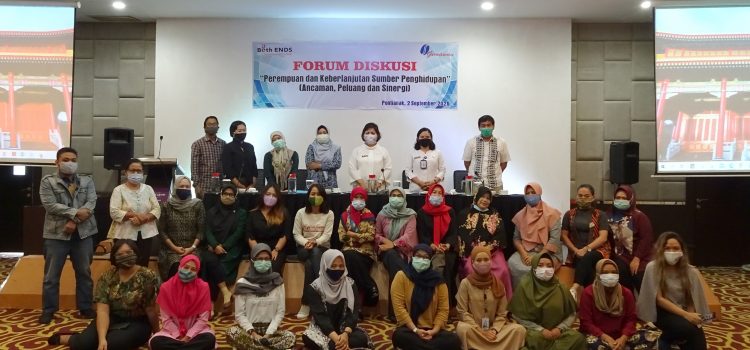
Mother-Earth, surely we normally hear this term. For people who depend their lives on nature, women and nature are like mothers and their children, as self and social identities, source of living, as well as guardians of tradition and the environment itself. Moreover now, in the reality of food agriculture and forest conservation, especially in West Kalimantan, the role of women exceeds men in the process and practice. The security of food availability at home depends on the big role of women from cultivation activities and utilization of forest areas
With the support of BothEnds, Gemawan conducted a discussion on the condition of women, local food agriculture and land use on Wednesday (02/09). This discussion aims to build understanding and respect for community rights, especially women who are still loyal to the option of sustainability livelihood.
Taking place at Mercure Hotel Pontianak, an activity with the theme of Women and the Sustainability of Livelihoods; Threats, Opportunities, and Synergy presented guest speakers from West Kalimantan Provincial Department of Women and Child Protection, the Department of Agriculture, Food Plants and Horticulture of West Kalimantan Province, and GAPKI (Association of Indonesian Palm Oil Entrepreneurs) West Kalimantan.
In connection with agricultural governance, according to the Director of Gemawan, Laili Khairnur, it is specifically about traditional agriculture. “In fact, in the field, in West Kalimantan traditional agriculture is more dominant,” she said, starting a discussion which invited CSOs in West Kalimantan as well as women’s groups from Sambas and Kubu Raya regencies.
The pandemic of Covid-19 has become a whip for us to always be ready to face a potential of new threats. “FAO predicts that nearly 822 million people will experience hunger after Covid-19, whether it is because of the reduce of food production or the hindrance of food distribution in urban areas. In regard to food production, based on the data from the global women’s movement, women contribute to almost 80% of food production, even though only 30-40% of it return to them, “she explained.
“To us, the reality of the management of existing nature – in the perspective of women – is still masculine, still exploitative. It is different from the women’s perspective which is willing to sustain,” she explained again. Food agriculture cannot only be seen from the perspective of men, because in reality, women play a very big role.
One of the traditional systems of sustainability of livelihoods for women is by huma/uma/umme or fields. Huma/Uma /Umme is a social and economic platform for women. It has a role as a meeting room, collaboration room, chat room, and even from there they can design women’s economic fulfilment together. “There is a term belale‘, in which groups can offer their power services in groups to other villagers who ask for assistance in manpower,” she explained again, “What is more important is to keep the local wisdom regarding the management of food agriculture and the overall agricultural landscape in the village, since all of the information belongs to them at the moment, “she said again.
The importance of the existence of huma/uma/umme will greatly contribute to the future of women, their families and society as a whole. It requires synergy from every element to maintain the existence of this traditional agricultural governance. Therefore, the support for community groups, especially women who are still loyal in conducting this practice, is important. “Farming is not merely an economic meaning but a value in the concept of huma/uma/umme itself,” she concluded.
